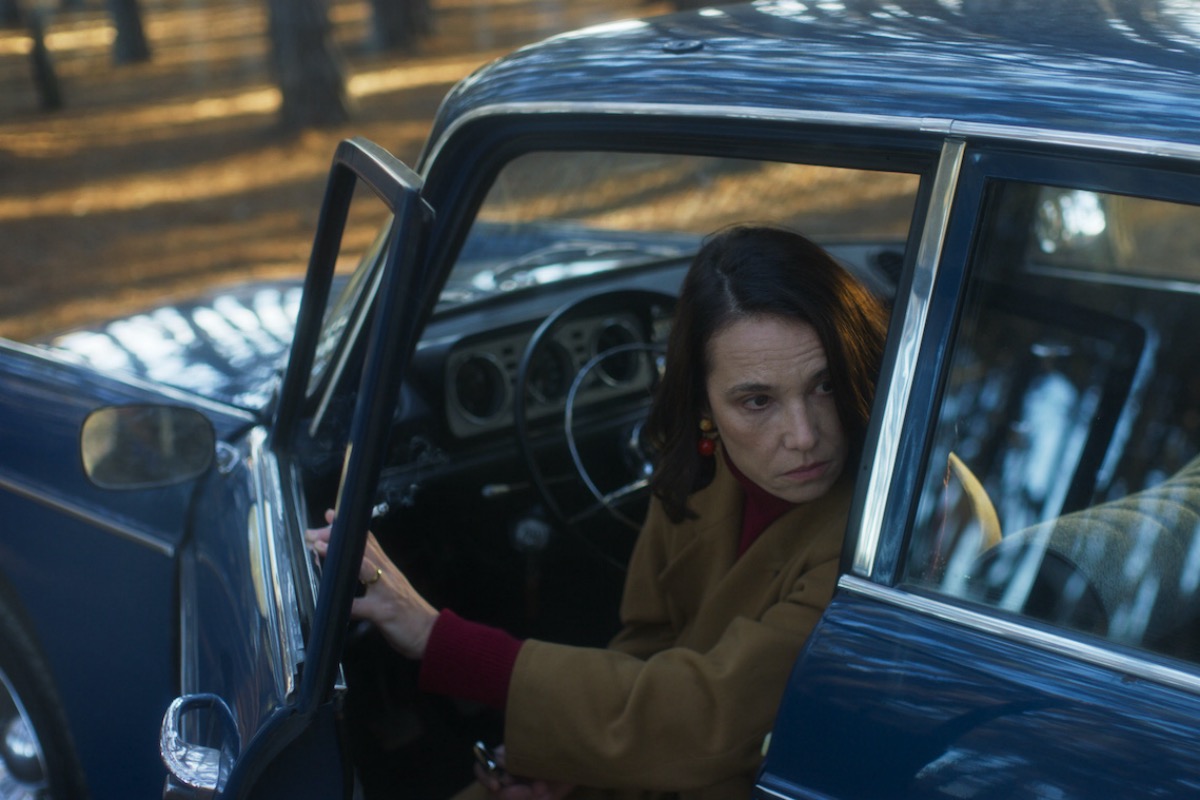

From Francisca Alegría’s ‘The Cow Who Sang a Song Into the Future’
Chile has produced some of the most daring, intriguing, exciting and sometimes unorthodox films to come out of Latin America, thanks in great part to government support, international co-productions and, most importantly, the re-opening of film schools and festivals after Pinochet’s electoral defeat in 1988.
Andrés Wood’s Machuca (2004), one of the first films to grab the bull by the horns in tackling Pinochet’s legacy, became Chile’s top-grossing film of that year. By 2008, 22 films were produced locally; in 2021, a record 121 productions were completed—and in the middle of a pandemic, no less.
So it was inevitable that Chilean cinema would also be part of a recent surge in women filmmakers beginning to leave their mark on screens of every size—a surge strengthened by the #MeToo movement, which, in Chile, led to the creation of the worldwide anthem against gender violence, “Un violador en tu camino” (a rapist in your path) as documented by Patricio Guzmán in his extraordinary documentary My Imaginary Country.
Unfortunately, unless you read the trades or such international film magazines as Sight & Sound, you might think Chilean cinema is limited to Pablo Larraín’s and Sebastian Leilo’s work, in the same way that most U.S. film buffs’ knowledge of Mexican cinema is currently limited to the Cuarón-Iñárritu-Del Toro triumvirate. Nothing wrong with their work (I, myself, am a huge fan of Larraín), but their critical and commercial success in this country doesn’t tell the whole story about what is happening in Latin American cinema, especially when it comes to the output by women filmmakers across the continent.
That impression could very well change with the eventual release of Maite Alberdi’s second Sundance-winning documentary, The Eternal Memory, and with the release this month, from distributor Kino Lorber, of two outstanding films written, shot and even scored by women: Manuela Martelli’s Chile ’76 and Francisca Alegría’s The Cow Who Sang a Song Into the Future.
Both films couldn’t be more different stylistically. Chile ’76 is an unnerving paranoid thriller that takes place three years after the 1973 CIA-supported coup that overthrew Salvador Allende’s democratically elected government, while The Cow Who Sang a Song into the Future is a magical realist tale about patriarchy, gender identity, the environment, and motherhood. Both feature strong, complex female protagonists, and both are feature debuts for their respective directors and both share the same executive producer, Andrés Wood.
Chile ’76 marks a reunion of sorts for both Wood and Martelli. She played Silvana, the feisty left-leaning teen who is murdered by Pinochet’s soldiers in Machuca. Chile ’76 also reunites her with actress Aline Küppenheim who played the protagonist’s mother in Wood’s film.
Both Machuca and Chile ’76 are told from the perspective of a middle-class outsider, children, and parents, who suddenly find themselves in the middle of history in the making—and not in a good way. But whereas Machuca had all the trappings of a traditional coming-of-age story, Martelli’s film is far more subtle, darker, and political. Like Larraín’s work and some recent Argentinian films like Benjamín Naishtat’s Rojo (2019), Chile ’76 is far more interested in those people who, either through their silence or complicity, enabled their countries’ dictatorial regimes to kill and torture innocent people.
As the film opens, Carmen (Küppenheim) is going over some images from a travelogue as she looks for the right shade of pink to paint the walls of her family’s summer home on the coast. Her conversation with the hardware store employee is disrupted by the screams of a woman being kidnapped by who we assume are members of Pinochet’s intelligence services. We never see the act, just Carmen, the hardware store’s employees and customers stand rigidly, staring off-camera in the direction of the screams. A drop of blue paint falls on Carmen’s shoe. As she leaves the store, she finds the solitary shoe of the kidnapped victim near her car.
Carmen leaves for the summer home with her kids, and her husband Miguel (Alejandro Goic) stays behind at the hospital he administers and will later join them. Once Carmen arrives, she is approached by Father Sánchez (Hugo Medina), a local priest who, aware of her past experience in the Red Cross, asks her to tend to a young priest who has been shot in the leg. She hesitates at first but, driven by that charitable spirit we see manifested later in the film and also by curiosity, agrees, even when her suspicions that the young man may have been involved in past activities against the current dictatorship are confirmed.


Aline Küppenheim stars as Carmen in Manuela Martelli’s ‘Chile ’76.’
Unable to secure antibiotics from her husband, she secures them from a local hospital through lies and deceit. She also agrees to contact his comrades to get him out of the church where he is hiding. She begins to lead a double life as the amiable, obedient and somewhat medicated wife of a well-to-do family and hostess to her husband’s reactionary friends (Antonia Zellers’ cameo as the hate-mongering wife of one of these friends is brutal in its toxicity) while toying around with a clandestine group.
Martelli and composer María Portugal ratchet up the paranoia with a synthesizer-driven score full of foreboding and ominous beats and sounds as Carmen begins to hear electronic clicks on her phone and finds the interior of her car turned upside down, creating an atmosphere full of dread and fear. Not the traditional fear of the horror movie, mind you, but the fear one feels of being observed and followed, the one that forces you to measure every word you say because you don’t know who’s listening. In other words, the fear of living in an oppressive, authoritarian country.
Küppenheim delivers a riveting performance as a woman who finds a sense of agency after being forced for so long to play the role of the perfect bourgeois wife. Carmen may be driven by both curiosity and generosity but at the same time one feels that she has found freedom in her small rebellious act, even though the price she pays for it, and the mental toll it takes on her, may drive her back to the acquiescent life she knows so well.
Francisca Alegría’s The Cow Who Sang a Song Into the Future opens not with a cow singing but with fishes singing as they swim and die at the shores of the Cruces River, killed by the toxins dumped in the waters by a local paper mill. “The rivers of the past were sweet and clear/ Now it carries something withered,” they sing as a woman wearing a red leather jacket and a motorcycle helmet emerges from the water. Her name is Magdalena (Mía Maestro) and many years ago she committed suicide by riding her motorcycle into the river with her feet tied to the pedals. Is she back for revenge? Or has a dying river given her new life?
When Enrique (Alfredo Castro) sees her from the window of a local shop, he collapses from an apparent heart attack. His son Bernardo, now in charge of his father’s dairy farm, calls his sister Cecilia (Leonor Varela), a surgeon in the city, with the news. She travels to the farm with her daughter and teen son Tomás (non-binary actor Enzo Ferrada) who identifies as a woman, an identity Cecilia refuses to acknowledge much less respect.
She quickly dismisses her father’s assertion of having seen her mother; it helps little that Cecilia witnessed her mother’s suicide and resents her for it. Magdalena slowly makes her presence felt in the family home, walking from room to room, every single electronic device turning on its own as she walks by, trying on new clothes, smiling at old photos. Her resurrection has left her mute as well. Tomás finds in Magdalena a kindred soul: they are both outsiders. In Magdalena’s case, she was the victim of a patriarchal system that locked her away in mental health facilities time after time for wanting to be herself; in Tomás’, the lack of support and love from Cecilia as she adopts the same patriarchal behavior—a patriarchy that is as dry and unproductive as the dry wells in the farm and as poisonous as the toxins thrown in the river.


From Francisca Alegría’s ‘The Cow Who Sang a Song Into the Future’
Nature in the end finds ways to heal itself no matter how much the human race throws at it. We hear that healing in the cows’ own mournful songs and see it In Tomás’ smile at a party thrown by a crew of Mapuche motorcyclists or in those very calves long separated from their mothers that lick Cecilia’s hands as if they were searching for their mothers’ teats to drink their milk.
The film meanders here and there but we are willing to go wherever it takes us. Alegría, especially after setting what little plot the film has in motion, evokes a dreamlike state through her framing, Pierre Desprat’s score, and her frequent cuts to the forest surrounding the dairy farm and the creatures (insects, birds) that live there.
Chile ’76 and The Cow Who Sang a Song Into the Future not only announce the arrival of two distinctive, idiosyncratic voices in Chilean cinema; like the women leading the Costa Rican New Wave and the work of such artists as Mexico’s Tatiana Huezo (Prayers for the Stolen), Lila Avilés (Totem, The Chambermaid), and Colombia’s Laura Mora Ortega (Kings of the World), directors Manuela Martelli and Francisca Alegría are harbingers of what is yet to come from Latin American cinema.
—
Chile ‘76 opens Friday, May 5 at Film at Lincoln Center and the IFC Center in New York City, and on Friday, May 12 at the Laemmle Royal in Los Angeles, followed by a national rollout.
The Cow Who Sang a Song Into the Future opens on Friday, May 19, at the Quad Cinema in New York City, and on Friday, May 26 at the Laemmle Theaters in Los Angeles, followed by other cities across the country.
***
Alejandro A. Riera is a film critic and the media coordinator for several music and film festivals in Chicago where he lives. He has been writing about film and television since 1993, when he joined the team of ¡Exito!, the Chicago Tribune’s Spanish-language weekly. He is a member and treasurer of the Chicago Film Critics Association and a rabid defender of Latin American cinema. Twitter: @AlejandroARiera


